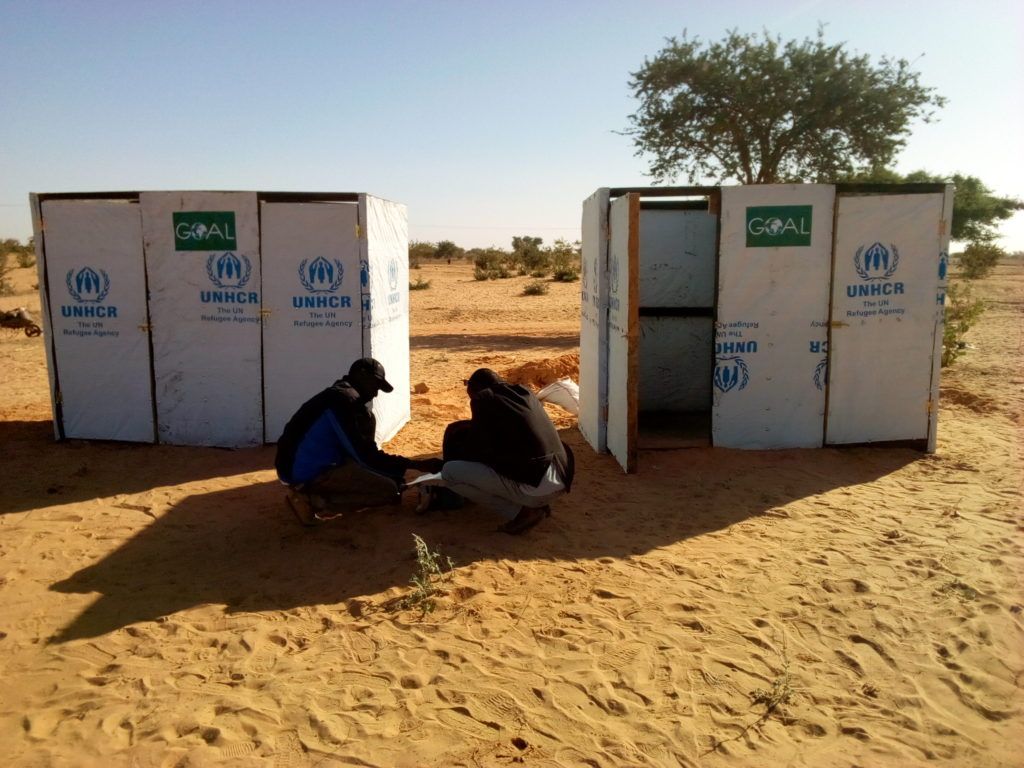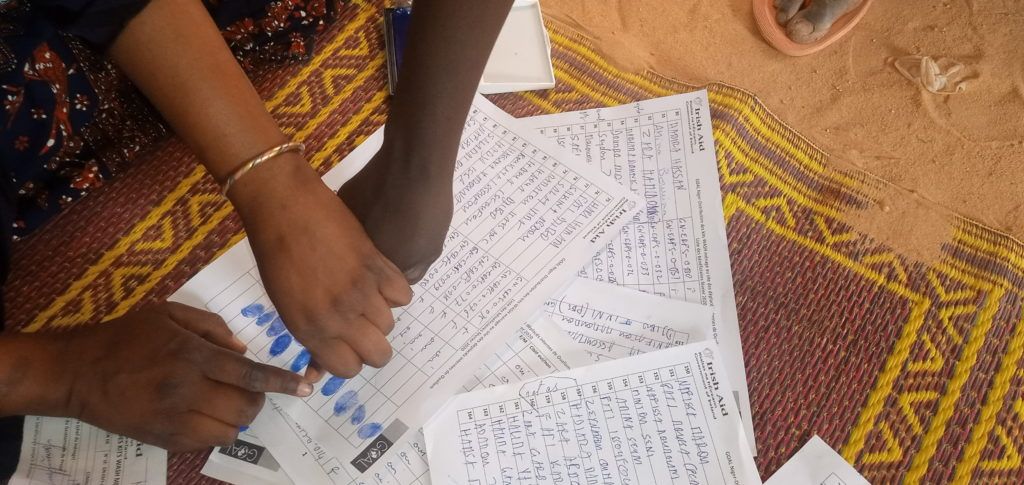 Stories
Stories
July 1, 2020 • 4 min read
As thousands flee from violence and conflict in northern Niger, GOAL offers support to those displaced in Ouallam refugee camp, ensuring their access to water and hygiene products.
In October 2019, violent armed conflict involving jihadists took place in the northern Tillabéry region of Niger. The conflict included kidnappings, car jackings and the killing of civilians. The clashes resulted in over 50,000 people being displaced within the province and put enormous pressure on the few health services that remain accessible. The conflict forced Biba Hamadou, Aissata Abdou Salam and their families to flee their homes from the nearby villages of Izwet and Balagouno Koira to the Ouallam refugee camp.
Both Biba and Aissata took refuge in Ouallam refugee camp, a site for internally displaced people. The camp, which hosts 2,646 people, is in the north-east of Ouallam town, 99 kilometers from Niger’s capital, Niamey. ACTED is the INGO that is leading on this site under the management of the government institution called the Departmental Directorate of Civil Status and Refugees. Biba, Aissata and their families are among many who have fled from surrounding villages. Both families were in desperate need of food and shelter on arrival.
By March 2020, the French NGO ACTED and the government institution in charge estimated that 378 families did not have enough food, potable water and other necessities needed for their safety and survival. Local and international NGOs as well as authorities within Niger were struggling to meet the needs of the displaced in Ouallam.
While water was available and delivered by trucks, a lack of basic containers hindered the ability of displaced people to stock adequate amounts of it. GOAL helped alleviate the problem of water shortage by donating materials such as water basins and jerrycans as well as soap to those in the camp. Many in the camp are now fearful of not having an adequate amount of food, as the rain season approaches. In Niger, the rainy season usually starts in April and continues until the end of October. This is usually a season of heightened agricultural activity for Niger’s farmers.
Biba Hamadou’s story

Biba Hamadou (45) holding the water basin and other items given to her by GOAL in the Ouallam refugee camp.
Biba Hamadou is 45 years old and arrived at the site in Ouallam with her two children, aged 11 and 16, a little over five months ago. She was fleeing violence in Izwet village, which is 55 kilometers from the camp.
Biba says that one of her biggest difficulties after arriving was the lack of potable water. ‘‘This problem was solved in part when we had water delivered by truck nearby, but there was still a problem with getting containers to carry, stock and use water at home,’’ she says.
GOAL helped alleviate this difficulty by donating a 50 litre basin, a 25 litre jerrycan and soap. “This ensured we were at least able wash our clothes and to bath. I am still using the containers and have soap left which GOAL gave us,’’ Biba says.
Without land to farm on during the rainy season, Biba is now appealing for food assistance, another significant worry for many of those within the camp. “With the rainy season approaching, we do not have any more land to farm on. We cannot go back to our villages, and it will be a struggle, and I have deep concerns about getting food for my family.’’
Aissata Abdou Salam’s story

Aissata Abdou Salam (22) holding the water basin given to her by GOAL in Ouallam refugee camp.
Aissata Abdou Salam is 22 years old and came to the camp from Balagouno Koira, which is 95 kilometers away. She arrived with her young son of 3 years and her husband joined them a short time later.
Aissata says the materials distributed by GOAL (which were distributed to female heads of households) helped them greatly. ‘‘It meant that at least we were able to gather potable water, and to keep both ourselves and our clothes clean.’’
During the rainy season, more than 80 percent of the 17.8 million Nigeriens depend on agriculture for food and income. ‘‘Using land to farm on is no longer an option for us. My husband and I are here with our children, but we do not have farming land here. I am worried that we will not have enough food.’’
“The materials distributed by GOAL to female heads of family helped us so much. I received a 50 litre basin, a 25 litre jerrycan, a half litre cup, a 30 litre bucket and 15 pieces of soap.”
GOAL has distributed supplies to 240 families on this site (it was intended to target women heads of family but some persons with specific needs were also targeted). The full kit was comprised of the items distributed to the families above.
Women are still in the camps and will remain there until the security situation improves and calm returns to their villages. They fled without belongings and as a result arrived in the camp with severe needs. Before their departure, women were also working on farms like their husbands. The current difficulties they face are not the absence of food but rather the reliance on others. They are eating what they obtain only from partners’ assistance, the food lacks diversity and they do not have access to farming land in Ouallam. Amongst organizations that GOAL is working hand-in-hand with are INGO Première Urgence International and IRC which has strengthened coordination and reach for children suffering from malnutrition.


